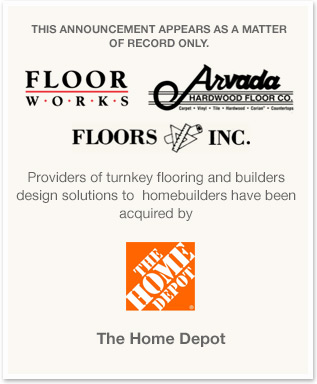
Goals of Original Client (Floorworks)
- Desire to sell company after achieving strong growth and profitability for estate planning purposes – company had grown with new home construction market, and owners wanted to sell to capitalize on their success before a potential economic downturn
Initial Sale Effort
- Group of strategic and financial acquirers were approached – all liked company, but expressed concern over: (i) customer concentration – largest customer was almost 50% of revenue; (ii) geographic concentration – all revenue tied to the Arizona building market; (iii) lack of management depth – three principal owners all over 55 years old and next generation of leadership was not ready to run the company.
- At end of initial effort, it was clear that Floorworks was not going to draw a premium price unless identified flaws were remedied.
Interim Work (Addition of Floors, Inc. and Arvada Hardwood Floor Company)
- Floorworks was a member of a national cooperative of flooring/builder design center companies with members across the country.
- The De NES Partners Principal who led the transaction asked for and received introductions to other members of the national flooring cooperative in an effort to create a larger offering. Five separate companies were initially chosen and interviewed as potential additions with two companies, Floors, Inc. and Arvada Hardwood, selected.
- To create a seamless offering, a “virtual” company was created by combining all three companies into the “Flooring Group”, which established an entity with seventeen shareholders and revenue of approximately $300 million. More importantly, the new entity eliminated all customer and geographic concentration issues as well as any concerns about management depth.
- An additional benefit of the “virtual” entity was the size and geographic scope of the business, which allowed for the buyer list to be expanded, including groups who would use the company as a platform to enter a new business segment.
Transaction Result
- The “virtual” company attracted interest from a multitude of buyers, including several publicly-traded companies.
- The combined business was purchased by The Home Depot, which felt the combined entity had the size and scope to justify entering a new business line.
- The Home Depot subsequently purchased several other flooring/builder design center businesses, including two others represented by the De NES principals, before spinning off the division to a private equity consortium under the HD Supply banner.
* This transaction was completed by a De NES Partners Principal while at a predecessor firm
